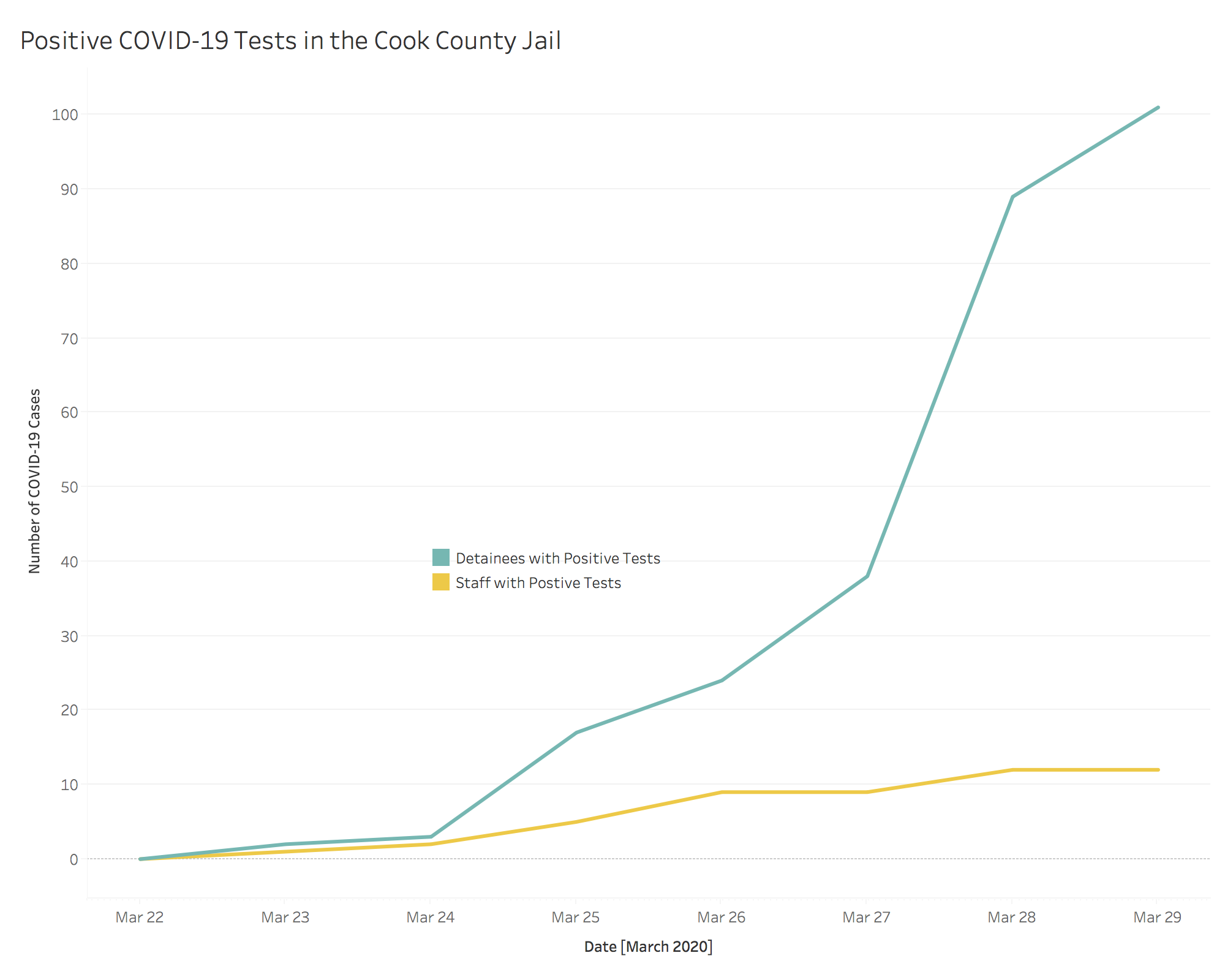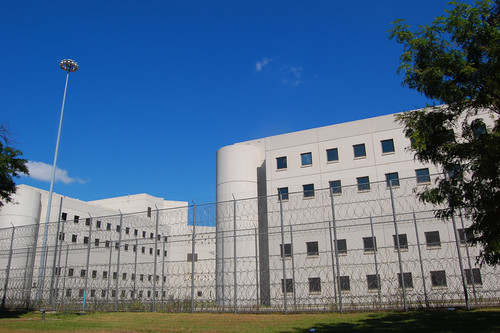As much of Chicago remains shut down due to COVID-19, criminal justice agencies are responding to an escalating outbreak in the Cook County Jail. The Chicago police, the jail and county courts system, and the Illinois Department of Corrections have all pledged to reduce incarceration as cases behind bars rise, but their efforts lag behind some other cities.
The rate of confirmed COVID-19 cases among people incarcerated in the Cook County Jail shot up rapidly last week, rising from two confirmed cases on Monday, March 23, to 134 cases on Monday, March 30. Twenty staff members also tested positive.
That means that nearly three percent of all people detained in the jail have COVID-19, a rate of reported infection close to forty times that of Cook County as a whole. Public health experts warn that incarcerated people are especially vulnerable during the outbreak; social distancing is much more difficult inside of a jail or prison, and access to cleaning products or even handwashing is often limited.

Additionally, testing in the jail may only be identifying some cases. Through Sunday, only nine people tested negative of the 143 tested. Statewide, about one of every six tests identifies a case of COVID-19, compared to nine out of every ten in the jail; the higher rate of positive results is one of a number of indications that suggests the jail’s current testing may be an undercount of cases.
At a Friday press conference, Dr. Connie Mennella, chair of correctional health at Cermak Health Services—the hospital inside Cook County Jail—indicated that jail staff are primarily testing inmates who display symptoms. This practice also raises the possibility that staff are missing large numbers of cases. COVID-19 symptoms often take about five or more days to show up, and some people who are infected do not display symptoms, even though they can pass the disease to others.
Earlier in the week, the Cook County Public Defender called for large reductions in the jail population to protect incarcerated people. Chief Criminal Court Judge LeRoy K. Martin Jr. ordered a review of cases, but resisted calls to release entire groups of at-risk people.
At a press conference on Friday, Cook County Board President Toni Preckwinkle and Cook County Sheriff Tom Dart reaffirmed their commitment to releasing more people, saying that roughly 1,000 people detained for nonviolent offenses could be eligible. Dart, who oversees the Cook County Jail, estimated that about twenty people were being released each day due to new review procedures. Overall, the jail population has declined by about 600 people over the last week, with the current population reported at about 4,800, according to data compiled by Injustice Watch. Dart also promised that nearly everyone would be moved to single cells in the next few days.
Afterward, advocates criticized the pace of releases. Sarah Staudt, a lawyer and policy analyst at the Chicago Appleseed Fund for Justice, said in a statement that “if we continue to move at our current glacial pace of release, hundreds of people will crowd and overwhelm our hospitals, and many of them will die.”
Other jurisdictions have moved to release people from jails and prisons, including the temporary release of up to 1,000 people in New Jersey and the release of 1,700 in Los Angeles County.

One person in the jail, who requested anonymity to prevent retaliation, expressed frustration with the jail’s response, saying, “It’s extremely irresponsible. It’s more reactive than proactive until a person dies, that’s when they’ll make serious inquiries to prevent it for real.“ He also said that people were highly concerned and on edge due to concerns about infection.
Meanwhile, the Illinois Department of Corrections has barred the state’s county jails from transferring people to state prisons, with limited exceptions. The move was criticized by Dart, but encouraged by civil rights advocates who say that the county jail has more room for social distancing. There are also fears that transferring people from Cook County could lead to new outbreaks. A cluster of COVID-19 cases in the Stateville Correctional Center has already led to the death of one incarcerated person and the hospitalization of twelve others. A further seventy-seven people have symptoms.
Two staff members at the Metropolitan Correctional Center, a federal prison in the South Loop, have also tested positive. The federal public defender for the Northern District of Illinois has called recent rulings blocking the release of inmates at the MCC “short-sighted”; Chief District Judge Rebecca Pallmeyer did not respond to the Sun-Times’s request for comment.
Both the state prison system and local jails have also shut down most in-person visits.
While the jail system attempts to reduce the number of people inside jails, the Chicago Police Department has also announced major changes. Interim Superintendent Charlie Beck announced that he had ordered officers to reduce stops and arrests. At a press conference on Tuesday, Beck declared that stops had already declined significantly, saying “normally as a chief, that would upset me. But in this case, it tells me [officers] are doing exactly what we’re asking them.”
More than fifty officers have tested positive for the coronavirus as of Monday evening.
Cook County State’s Attorney Kim Foxx also announced that her office would suspend prosecutions of low-level drug offenders and that she would assist efforts to release some people detained at the county jail.
The changes in policy appear to be having an effect on the Cook County Jail. On Friday, Sheriff Tom Dart noted that in early March, the jail handled about 200 newly arrested people each day, but that number was now closer to sixty or seventy.
The situation involving COVID-19 in Illinois jails and prisons is changing rapidly. These are resources to help monitor the situation:
- Injustice Watch maintains a tracker that shows changes in the population of the Cook County Jail and also reported COVID-19 cases.
- The Cook County Sheriff’s Office is reporting updates about the spread of COVID-19 in the jail.
- The Weekly has compiled a list of resources for South Siders, including support for incarcerated people and their loved ones.
Andrew Fan is a journalist and data analyst. He last wrote for the Weekly about an anti-violence march on 79th Street in 2017.



